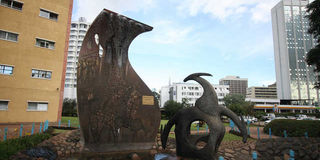Premium
MPs give Education Ministry seven days to address UoN governance crisis

The fountain of knowledge at the University of Nairobi.
What you need to know:
- The legislators demanded that the Principal Secretary for Higher Education submits a detailed report on the governance challenges facing the university.
- The directive came a day after the Universities Academic Staff Union (UoN chapter) called for the removal of the council chair Prof Amukowa Anangwe.
The National Assembly Education Committee has given the Ministry of Education seven days to submit a report on the University of Nairobi governance crisis, blaming the ministry of inertia in dealing with the issue.
The committee warned that failure to act swiftly could lead to a deeper institutional collapse. They accused the council, of interfering with the institution’s management.
The lawmakers said the council’s overreach is disrupting operations at Kenya’s top university, and called for urgent action to restore order.
"We are directing the Ministry of Education to submit a report on the University of Nairobi within seven days. There is clear inertia in the ministry—if we allow more time, we may never get answers. We saw what happened with Moi University, we warned about it, but it still sank. We cannot allow UoN to follow the same path. This committee demands action now," said Kisii Woman Representative Jerusha Momanyi when she chaired a committee sitting on Thursday.
The directive came a day after the Universities Academic Staff Union (UoN chapter) called for the removal of the council chair Prof Amukowa Anangwe, who they accused of usurping managerial powers.
Members of Parliament raised concerns over the management crisis at the University of Nairobi, accusing the university council of interfering with administration and running the institution as an executive body. The lawmakers, sitting in an education oversight committee, called for immediate intervention to prevent the institution from collapsing.
During a heated session, the legislators demanded that the Principal Secretary for Higher Education submits a detailed report on the governance challenges facing the university.
Some MPs went further, insisting that the Cabinet Secretary for Education, Julius Ogamba, should appear before the committee to address the matter comprehensively.
“We are telling you the problem — the University of Nairobi council has installed itself as an executive. There has been a silent coup at the university,” Nabii Nabwire, the Lugari MP stated.
The PS for Higher Education, Beatrice Inyangala acknowledged the governance and funding challenges in public universities, highlighting the ministry’s ongoing efforts to stabilize the sector. She outlined a three-pillar strategy focusing on strengthening governance, implementing cost-cutting measures, and diversifying funding streams.
“To address governance, we will be advertising for council positions next week. This will allow us to bring in the right expertise for leadership and strategic growth,” the PS told the committee.
However, MPs remained skeptical, citing cases where university leadership positions have remained in acting capacity for extended periods.
“The University of Nairobi has almost all its top management in an acting capacity. The same issue is evident in the Open University of Kenya, where interviews were conducted, but no substantive appointment was made,” said Clive Gisairo, the MP for Kitutu Masaba.
The PS further noted that budget cuts in the 2024-2025 financial year had severely impacted the State Department for Higher Education, which was already underfunded.
"Right now, Sh10 billion was actually taken away from the State Department for Higher Education, which is already grossly underfunded," she said.
She further highlighted that operational funding had been significantly reduced.
"For our operations, our budget was cut from Sh300 million to Sh128 million. As a result, even delivering on our coordinating and oversight mandate has been a serious challenge," she stated.


